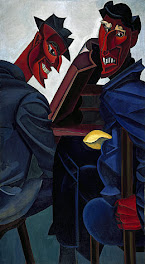The divine is here defined as that which allows the human being to dis-cover beings in that and how they are, their existence and essence, thought metaphysically. Within metaphysical theology three moments of the divine were posited as beings, persons, referred to in Catholic tenet as the Trinity.
Of the 'persons' in the Trinity, only Christ in his role as the second person, the Logos, is in fact a person per se. Returning to the original dynamic meaning of 'theo', 'to shine', the first moment of the trinity is the original 'shining' that allows beings to be experienced in that they are, in their pure existence. While Catholic theology was written in Latin the original Greek term Logos was reserved for the second person. Logos is the gathering-clearing enacted by the divine as it appears within man. It is this Logos, not mere speech but the entirety of context and world made possible linguistically that allows beings to be experienced as what they are, metaphysically in their essence.
The third moment is the reference to the divine itself rather than its actions. The 'ghost' is that apparition that is not graspable since it only presences through absencing. The absencing, the withdrawal of the divine itself that has always already occurred provides the first and second moments with their lighting and clearing respectively.
+-+1920-21+A+Reading+of+Ovid+(Tyros).jpeg)


